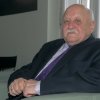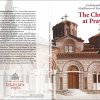Popovic was born in Belgrade, Serbia, where she received her first piano lesson at six years of age. Upon graduating from the music high school in 1997, Popovic moved to Munich, Germany where she attended the Hochschule für Musik und Theater and studied under the guidance of Professors Gitti Pirner and Claude-France Journes. After performing in New York City, Popovic decided to remain living there. She is currently working on her solo album, which will primarily feature classical Serbian music.
Popovic has won several awards, including Second Place at the National Piano Competition in Belgrade, Fourth Place at the International Competition in Rome, and is participating at various festivals around Europe, including those in Italy, Germany, and Austria. In 2005, she was honored to be invited to play at the International Keyboard Festival in New York City. Popovic subsequently continued to live in New York. In 2006, Popovic received the Passantino Award for Special Achievements from City University of New York and the following year she performed at Steinway Hall and Lefrack Hall, Carnegie Hall in New York, and Kolarac Hall in Belgrade. Popovic has worked with several artists such as composer Rodin Scedrin, pianist Vadim Suhanov, and double-bassist Roman Patkolo among others.
Popovic is a co-founder of a new organization for the benefit of not only Serbian artists, but all artists interested in international exchange of culture. Jasna Popovic has made recordings of ethno-classical Serbian music honoring Queen Elizabeth.
Source: Wikipedia
Jasna Popovic: "Serbia Around the Piano World"
2/25/2019
Renowned Serbian pianist Jasna Popovic leads a group of talented musicians on a journey through the sounds of contemporary music from around the world, combined with Serbian traditional and jazz music.
VIDEO
Interview Jasna Popovic: IN EUROPE YOU PLAY, IN THE STATES YOU DO BUSINESS
04.06.2018 Belgrade / New York
Interviewer: Marija Sajkas
A PIANIST WHO REPRESENTED SERBIA AND ITS MUSICAL HERITAGE IN A NUMBER OF CONCERTS IS GOING TO DO IT AGAIN WITH STYLE. SOUNDS OF SERBIA WILL BE HEARD IN CARNEGIE HALL
Born and educated in Belgrade but a New Yorker by sensibility, Jasna Popovic is equally well known for her innovative, inspiring and technically perfect performances in the artistic circles of the City that Never Sleeps as for her activities in the Diaspora.
In the past few years, at her initiative and in cooperation with Mirjana Lazarevic, the Artistic Director of KOLARAC NATIONAL UNIVERSITY HALL (Kolarcev narodni univerzitet) concerts for KOLARAC were held in New York, Washington, Boston, Miami, London, Paris and Moscow with the view of purchasing a Steinway piano for the above mentioned elite concert institution: both then but also as a part of her regular repertoire, Jasna Popovic represented Serbia and its music in numerous concerts, and this fall she is going to do it again with style; more precisely, on the Great Stage of Carnegie Hall.
It has just been confirmed that the Ministry of Foreign Affairs is going to sponsor the Project “Sounds of Serbia“. It is a musical performance that will be staged at Carnegie Hall, New York City on September 24, 2018, and which will present Serbia in a very distinctive way. Could you elaborate briefly on what it is about? What is it that makes this performance unique?
Ten years ago, I held a concert titled “Between East and West” in Carnegie Hall, New York in which I introduced our national classical music to the audience. Beyond my expectations, the concert sold out. I seized the opportunity to invite many members of the American academic community and to introduce our cultural heritage as well as the outstanding Vasilije Mokranjac to them. Even back then, I thought how it would be great if the Serbian music could find its way to the New York audience but in a broader form, so we’ve decided that this time, in addition to classical music, the program will also include spiritual, jazz and traditional music.
Seeing and listening to the musical ensemble ROSA will be particularly interesting. Behind the name is a very special vocal group?
Yes, they are Serbian ethnic music singers. The idea behind the Project is to introduce to the world primarily the artists who work in America cherishing the sounds of Serbia. Rosa is a female group of girls who graduated jazz from Berkley. Aleksandra Denda is the band leader while other members come from different countries ranging from America to Italy. They sing the unique, ethno, vocal music. Our famous jazz duo Alma and Rale Micic have confirmed their participation in the Project along with the pianist Djordje Nesic while others’ confirmations are yet pending but as soon as we get them, it will be published. Anyway, it is going to be a kind of journey through time and sounds of Serbia. I have to say that the Project wouldn’t have been pulled off if it hadn’t been for the assistance of the Serbian Consulate in New York City as well as the people from the Department of the Diaspora, the Ministry of Foreign Affairs, who showed readiness to recognize and support us.
The Project “Around the Piano World“ you are currently working on is attracting attention of the American music community but also composers from around the world.
It all stemmed from my wish to play new compositions. I posted on Facebook that composers are welcome to send their new, short compositions, which I am going to play for the first time in New York. That’s how it started and in no time musicians from all over the world started contacting me. It was easy to receive piano compositions from Italy or France but when it comes to Andorra, Angola or Nigeria where piano is not a major instrument, it wasn’t that easy. For that reason, this seemed interesting and it was very challenging to learn those compositions and play them in public. So far, I have received compositions from 30 countries and that’s where I put the competition on hold for other composers until I am done with the compositions I have received. Again, I have to thank people from the institutions that support art. To be more specific, the Project would not have been pulled off if there hadn’t been for the support of Joe Patrych, the producer, sound engineer and owner of the Patrych Sound Studio. The Project expanded my perspective and introduced me to very interesting and creative people from all over the world. I’ve just got a call from the National Television of Andorra asking for the permission to use my recording of the composition from Andorra.
Who is going to represent Serbia in “Around the Piano World“?
Danijela Kandilari is going to represent Serbia. She was born in Novi Sad but lives here in New York.
And what brought you to New York? You graduated from the Music Academy in Munich.
Well, before the Academy it was the School of Music “MOKRANJAC“ since the age of six. However, I started practicing seriously when I turned twelve. Then, the piano became my thing. Later, I learned that other pianists shared a similar experience because, I guess, it is at that age that we develop emotions and properly relate to what we are playing. At the age of sixteen I wanted to study in Russia but my family insisted that I should graduate from high school first. However, I outwitted them and graduated from high school early so when I turned seventeen they sent me to my cousin’s in Munich, which was the most convenient thing to do. Since my parents are not musicians nobody really knew where I should go and it was 1996/1997 when the country was very isolated. I remember my father driving me across Hungary and Austria to get me to Munich. In Munich, I met Japanese who asked me what other schools I had applied to but it didn’t even occur to us that I could have applied to some other schools too beside the ones in Belgrade and Munich! Only then did I realize how strong the Music Academy in Munich was. Out of the applicants from all over the world who auditioned that year, only three of us got admitted. In addition to art studies, I completed pedagogy as well. Anyway, German schools of music and European schools of music in general cannot be compared with the American schools. The state funds the schools there and they are very traditional too. First, we all had to learn how to play Bach, Mozart and Beethoven.
So, how would you compare the attitude towards classical music in Europe to the one in the States?
Generally speaking, in Europe the focus is on how you play while in the States business is what matters. I think that it would be ideal to experience both in order to get a full picture. There are many brilliant pianists, but the other side of business is also very important in order to beat the strong competition.
Still, you decided to come to the States?
Yes, but it was not a conscious decision. When I got back from Germany to Serbia, I thought it would be for good. However, six months later I applied for the piano festival in New York and got accepted. In New York, I realized for the first time how small my musical world was and that it was only a tiny piece of the things going on around me. I enrolled Master classes with Nina Lelcuk, a famous Russian pianist and professor. In fact, she was the one to talk me into studying in America. Since I lived both in Serbia and Germany, it was easy for me to get used to life in New York and soon, my career took a whole different course. While I was in Germany, I mostly played in Italy and surrounding countries. But here, opportunities opened up for me to play in Asia, South and North America. What’s more, it opened the doors for me of my favorite concert venue, the big concert hall of Carnegie Hall.
In addition to Carnegie Hall, you performed at different concert halls ranging from Kennedy Center in Washington, United Nations and Lincoln Center.....to KOLARAC in Belgrade. How does it feel to play at KOLARAC compared to other halls and audience?
Basically, it is the same. Our KOLARAC is the equivalent of Carnegie Hall. Many concerts are staged both here and there. The only difference is, of course, the financial side of it. Here, they have funds to bring over the best orchestras in the world all the time. As regards the reaction of the audience, people from our country are far more emotional when showing reactions. Recently, I’ve had three concerts in a single week in America. The first one was in New York, then Washington and finally Los Angeles. In New York, the audience is always in a rush, everybody arrives just on time but they are very warm. In Washington, everybody arrives in time but it was rather difficult although at first, I did not get why. Then I realized that diplomats made up most of the audience. Diplomats express their emotions differently and it is only at the end of the concert that you learn whether they like it or not. When it comes to Los Angeles, the audience arrived an hour before the concert to have a chat and a glass of wine. They were full of joy, happy and relaxed. As regards the audience in our country, I am very attached to Belgrade and Serbia. I have many friends there and my whole family lives in Serbia, so the concerts are usually very emotional for me. There is always a friend or a cousin who starts crying in a concert, so the concerts held in Belgrade are very special to me.
MOZART vs. BEYONCE
Simultaneously with the career as a pianist, you have also been engaged in education. You often work with children who are being introduced to the piano for the first time. However, you’ve noticed that different nationalities react differently to piano practices?
There are differences in the mentality and patterns according to which different nationalities instruct and educate their children. Americans want to learn everything through play and they value the piano highly when it comes to education although in most of the cases they do not even intend to deal with music seriously. Russians are resistant to any criticism while the Chinese look at their parents who jot down everything I say. Although I was clear with cultural differences it took a really long time for me to accept class differences within the City. For example, the names of Beethoven and Mozart meant absolutely nothing to the kids from the Bronx where there are many poor kids so we talked about music and learned notes from the songs by Beyonce and Rihanna. They led us to Mozart and Beethoven in the end. The situation is slightly different on Park Avenue. Conditions for work are excellent and teaching is so much easier. Children have their own concert pianos at home and if they want, they can fully focus on music.
Source: Novi magazin






